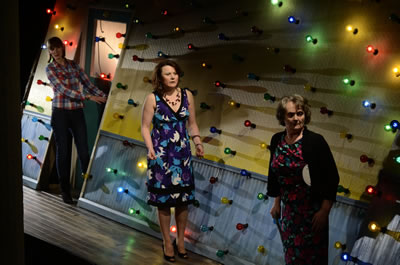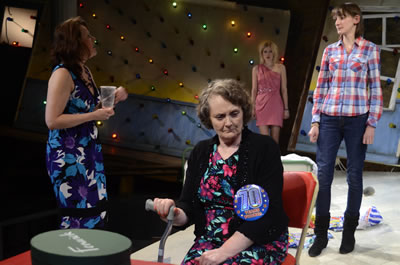A Shabby Chalet and Great Lines Make For A Dramatic Evening at The Bush
Madani Younis’ directorial debut is a hit: Penny Flood reviews Chalet Lines
Madani Younis, the Bush’s new artistic director has made his directorial debut at the theatre with a smashing play by newcomer Lee Mattinson. Surprisingly, Mattinson’s a man as this is a play written from the female perspective, offering cracking roles for women. The cast at the Bush get stuck in to make the most of their opportunity.

It’s the story of four generations of women in a family of women, set over a period of 50 years. Their present lives are deeply affected by the past and they seem incapable – or unwilling – to try to do something about it. The action moves backwards and forwards between 2010 and 1961, opening windows which explain why things are the way they are.
The script is fast, funny, foul-mouthed and politically incorrect, shifting in a heartbeat from hearty laughter to unbearable sadness and pathos before lurching back to in-your-face harsh reality. Younis directs with flair and control in managing the dramatic shifts in emotions.
It opens with Nana Barbara’s 70th birthday celebrations which have already gone wrong as nobody booked a table at the restaurant and they’ll have to have a take-away. With Nana are one of her two daughters, Loretta (Monica Dolan) and her two grandchildren, the man-mad Jolene (Robyn Addison) and the introverted, musical Abigail (Laura Elphinstone). But the present company doesn’t matter much to Nana, she only wants her other daughter, Paula (Sian Breckin).
Nana is played magnificently by Gillian Hanna. She is at the heart of the story, giving the play depth as she switches from cantankerous matriarch to reluctant bride (in 1961) and back to cantankerous matriarch, but the second time around it’s different as we know so much more about her and understand her underlying sadness. In one desperately touching scene we see her alone on the stage, as she comes out of the bathroom only to discover the girls have gone out without her.

All the action takes place in a chalet in Butlins holiday camp, where the family have gone every year since the day Nana got married from there. It is the place where they’re meant to have a good time. The chalet is garish and tatty and seems to be falling apart with doors that stick and hang badly, and there’s no hot water. The design by Leslie Travers adds to the play’s edginess as it is set at angles and teeters across gaps in the stage, making it precarious at times for the high-heeled actresses.
Sex the main topic of conversation, as these women can generally define themselves only in terms of their relationships with men, even when the relationships are a disaster. Loretta sneers at Jolene because she’s still not married, unable to see the irony because the state of her marriage is nothing to be desired. In spite of her faulty role models, Jolene dreams of being married but like her mother’s they’re shallow dreams inspired by soap-operas and trashy women’s magazines.
Abigail, however dreams of being a musician, playing an imaginary keyboard (made of sticks of chewing gum). A scene set in 1996 reveals her close relationships with Paula, the one member for the family who has moved out of Nana’s orbit.
Of course the humour can’t last. As the Cava slips down old animosities and sibling rivalries come to the surface it stops being funny. Loretta gets more vicious; Abigail withdraws into herself; Jolene is inconsolable as the boyfriend has dumped her (she seems to be the only one who couldn’t see this coming) and Nana is angry because Paula doesn’t come.
A special mention for Dolan, who managed to imbue Loretta with a humanity that made me feel sympathy for her even when she was at her most obnoxious and spiteful, and she also plays Nana’s mother in 1961, a very different character to Loretta.

The condition of the chalet could be a metaphor for their lives: it started well but look at it now. Will they be back next summer because they’re trapped? Is there hope? Paula got away so perhaps there is. The characters in the play are so vivid and alive that you want to know what happens to them when the play is over.
Unfortunately, the ending doesn’t quite work. It closes with Abigail playing her chewing-gum keyboard singing ‘Don’t let the sun go down on me’. This left me wondering what Mattinson is trying to achieve. He doesn’t patronise the audience with a happy ending, but it’s not depressing either as Abigail has made a move by divorcing her husband. The play’s script says that as she sings ‘we see her for the first time’. This needed to be articulated more strongly on the stage.
For a first major play, Mattinson set himself a tough challenge in dealing with time shifts as well as establishing the relationships between such strong characters, and he’s done it with great
Chalet Lines continues at the Bush Theatre until May 5th. For more information, visit the website or call the box office on 020 8743 5050.
March 7, 2012
Related links
|